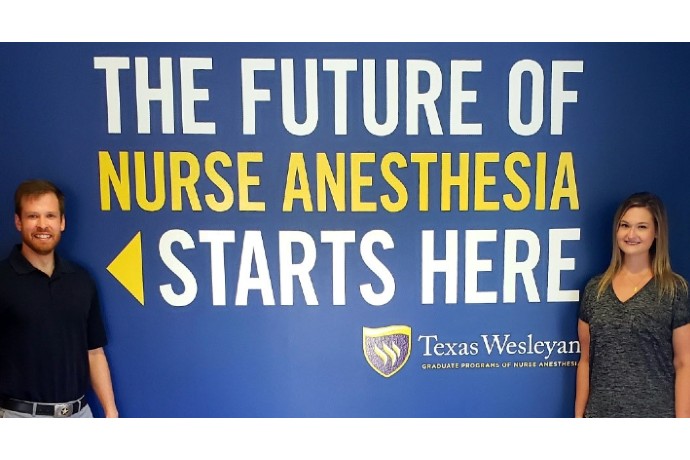Students present 'GAS' Mentorship

As the pinnacle of the nursing profession, Certified Registered Nurse Anesthetists (CRNAs) must constantly practice at the height of their skill. The onus is on us to seek out educational opportunities that improve ourselves and our practice. In May 2020, Dr. Terri Kane DNAP, CRNA, program director/associate professor and Dr. Jose D. Castillo III, Ph.D., MSNA, CRNA, assistant professor, challenged the students in their Leadership for Advanced Practice Professionals class to propose new practices that would improve Texas Wesleyan’s nurse anesthesia program, with the best ideas to be implemented the following semester.
Early in the program, some students have the benefit of knowing program graduates or current upperclassmen and can receive insight regarding study habits, prioritization or even simple commiseration about the workload. When speaking with classmates, those who did not have those same relationships acknowledged that it may have eased some of their stress if they had been able to reap the same benefits. Just four short months after being approached by Dr. Kane and Dr. Castillo for ideas to improve the nurse anesthesia program at Texas Wesleyan, students Chelsea Owen and Nathan Culross presented the Graduate Adaptation Support (GAS) Program. They used peer-reviewed, published research studies about other institutions’ mentorship programs, and established a similar program building on the strengths and rectifying perceived weaknesses. This is the first mentorship program for the incoming doctor of nurse anesthesia students at Texas Wesleyan. The GAS program is volunteer-based and pairs an upperclassman with 1-2 lowerclassmen in a randomized fashion. The goal is to ease a fraction of the stress of the difficult first year. This is done with study tips, advice regarding the building of good habits and even guidance regarding stress management through wellness activities. While preserving the mental health of the students is the main focus of the GAS program, additional benefits of improving communication skills and increasing the Texas Wesleyan CRNA network are being nurtured as well. As many CRNAs know, we are a small, tight-knit community and there’s always someone who knows someone. With the support of the nurse anesthesia faculty, the GAS program is now in its pilot year.
Dr. Craig Atkins DNAP, CRNA, assistant professor, commented on the GAS program, “You know, I think it’s a great idea. It’s so novel and easy to overlook but you [did] a great job.” Kaytlyn Remedes, a second-year doctoral student from the 2022 class, said “Thanks for putting this together. Can you imagine how much easier navigating our first year would have been if we had had something like this?” When pushed by the best, Texas Wesleyan students are forging the future of anesthesia.







